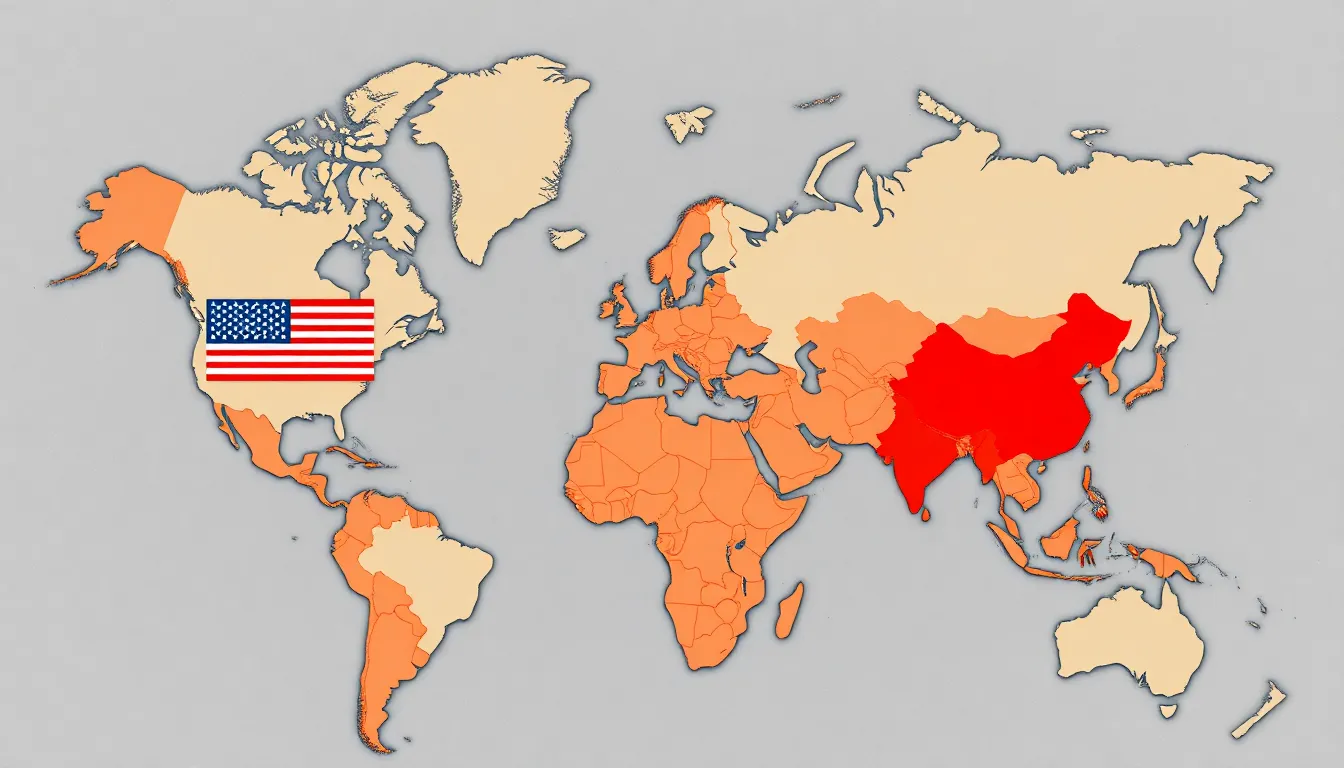Table of Contents
ToggleIn a world where borders are more like suggestions than rules, geopolitical issues have become the ultimate soap opera. From trade wars that could rival any reality TV showdown to alliances that shift faster than a chameleon on a disco floor, understanding these dynamics is crucial. It’s not just about maps and flags; it’s about the intricate dance of power, resources, and yes, even a bit of drama.
Overview of Geopolitical Issues
Geopolitical issues involve the distribution and competition of power among nations. Trade wars have emerged as significant tools for nations to assert economic dominance. Countries engage in alliances not just for defense but also for economic benefits, showcasing how interdependence shapes global politics. Resources such as oil, minerals, and water play crucial roles in these dynamics, influencing both regional and global stability.
Shifts in alliances can dramatically alter the balance of power. For example, the partnerships formed in Asia-Pacific have implications for security and trade in the entire region. National interests often clash, leading to tensions and conflicts that can escalate quickly. Observers note that issues such as climate change also add complexity, as they compel nations to collaborate or confront each other over diminishing resources.
Global organizations attempt to address these issues, though their effectiveness varies. Some nations prioritize sovereignty over collective decisions, creating friction within international frameworks. Furthermore, communication tools shape public perception and diplomatic strategies, driving narratives that can incite or temper conflicts.
In this intricate landscape, understanding the motivations behind actions remains essential. Political leaders navigate a web of historical grievances and strategic interests, with actions often sparking unintended consequences. Thorough analysis reveals that the interplay of domestic policies and international pressures continues to redefine global interactions.
Major Geopolitical Players

Understanding the impact of major nations is crucial for grasping current geopolitical issues.
The Role of the United States
The United States serves as a cornerstone of global politics, wielding substantial economic and military power. Trade agreements often reflect its interests, influencing global markets. Alliances like NATO illustrate its commitment to collective security, maintaining influence in Europe and beyond. Domestic policies frequently affect its foreign relations, with debates over economic sanctions shaping its diplomatic strategies. The U.S. presence in international organizations further underscores its role in addressing global challenges.
The Influence of China
China has emerged as a formidable geopolitical force, with rapid economic growth catalyzing its global influence. Its Belt and Road Initiative signifies efforts to expand trade partnerships and infrastructure. Military advancements strengthen its position in the Asia-Pacific region, raising concerns among neighboring countries. Trade policies and competitive practices impact global supply chains, leading to tensions with other nations. China’s involvement in international organizations reflects its ambition to reshape global governance structures.
Russia’s Position in Global Politics
Russia maintains a distinct role in global affairs, often asserting its power through military actions and strategic alliances. The annexation of Crimea exemplifies its willingness to confront Western influence directly. Energy exports play a critical role in its economic strategies, impacting Europe’s energy security. Bilateral relations with countries like India and China highlight its efforts to forge alternative alliances. Additionally, Russia’s involvement in global conflicts creates further complexities in international diplomacy.
Key Geopolitical Issues Today
Geopolitical issues shape the global landscape through complex interactions among nations. Significant challenges such as territorial disputes, climate change, and cybersecurity threats force countries to adapt their strategies continuously.
Territorial Disputes
Territorial disputes escalate tensions across various regions. Longstanding conflicts, such as those in the South China Sea, involve claims by multiple nations over strategic waters and resources. Both China and its neighbors assert competing rights, often leading to military encounters. In Eastern Europe, Russia’s annexation of Crimea intensified hostilities and reshaped alliances. Other regions, like Kashmir, also witness enduring conflict between India and Pakistan. These disputes influence international relations and stability, necessitating diplomatic efforts to mitigate conflicts.
Climate Change and Resources
Climate change exacerbates competition for vital resources. As droughts and rising sea levels affect agricultural outputs, nations face pressure to secure water and food supplies. Countries in Africa, for instance, confront challenges related to resource scarcity, prompting conflict over access. Global initiatives strive to address these issues, yet cooperation often stalls due to divergent national interests. Rising temperatures also lead to mass migration, further complicating geopolitical dynamics. Collaborative environmental strategies may foster relationships while also raising tension over shared resources.
Cybersecurity Threats
Cybersecurity threats pose new challenges in the geopolitical landscape. Nations leverage cyber capabilities to conduct espionage and disrupt infrastructure. Russia, China, and North Korea exemplify states utilizing cyber tactics for strategic advantage. Notable incidents, such as the SolarWinds hack, underscore how vulnerabilities can expose sensitive data and erode trust. Collaboration among countries becomes essential to enhance resilience against cyberattacks. As technology evolves, so too do the strategies and motivations of cyber adversaries, necessitating proactive measures and ongoing vigilance.
The Impact of Geopolitical Issues on Global Economy
Geopolitical issues significantly influence the global economy, affecting trade, investment, and financial stability. Trade wars instigate price fluctuations for goods and disrupt supply chains, complicating economic growth. Increased tariffs can diminish consumer purchasing power, leading to reduced demand for imported products, impacting overall economic performance.
Alliances shape economic landscapes, as nations collaborate for mutual benefit. The North Atlantic Treaty Organization (NATO) not only represents military cooperation but also fosters economic ties among member states. Countries like China leverage initiatives such as the Belt and Road Initiative to expand their economic influence, enhancing trade networks and access to markets in developing regions.
Resource availability plays a critical role, driving competition among nations. Oil and gas supplies often dictate energy prices, impacting industrial growth worldwide. Water scarcity poses another threat to economic stability, especially in arid regions where agricultural productivity declines due to climate change.
Strategic military actions can deter investment and create uncertainty. For example, Russia’s annexation of Crimea led to sanctions that affected its economy and had ripple effects across Europe. Financial markets react swiftly to geopolitical tensions, leading to volatility that can hinder investment opportunities.
International organizations strive to mediate conflicts and establish economic cooperation. The effectiveness of these organizations varies, as national interests sometimes override collective goals. Countries must balance sovereignty with collaboration to maximize economic potential.
Evolving cybersecurity threats represent a new frontier for global economies. Nations increasingly rely on digital infrastructure, making them vulnerable to disruptions. Collaborative efforts are essential to enhance resilience against cyberattacks and safeguard economic stability.
Future Trends in Geopolitical Issues
Evolving alliances are expected to transform how nations interact on the global stage. The focus on technology in international relations will likely increase as cybersecurity threats grow. Countries will prioritize resource management, particularly water and food, due to climate change impacts.
Heightened tensions in regions like the Asia-Pacific may prompt countries to seek new partnerships for security and economic stability. Cyber warfare and espionage tactics reveal the need for nations to develop robust defenses. Meanwhile, unilateral actions from powerful states can disrupt established norms and provoke reactions.
Emerging global powers such as India and Brazil will play pivotal roles in shaping future geopolitical dynamics. They may leverage their growing economies to influence international policies and resource distribution. Trade agreements could become increasingly complex, reflecting shifting alliances and competing interests.
Technological advancements will also change military strategies, as nations invest in artificial intelligence and advanced weaponry. The interplay of traditional military might and new technologies will redefine power balances. Furthermore, international organizations may adapt their approaches to mediation, striving for effectiveness in a more fragmented geopolitical landscape.
Economic sanctions will remain a common tool for asserting dominance, impacting global supply chains and markets. Nations must navigate these complexities carefully to safeguard their interests. Trade wars and resource conflicts will continue to pose challenges, emphasizing the importance of diplomatic efforts.
Ultimately, understanding these trends provides insight into the future of global geopolitics. Heed the movements of major players, as their actions could reshape international relations and impact global stability.
The landscape of geopolitics is ever-changing and increasingly complex. As nations navigate their interests and alliances, the interplay of power and resources will continue to shape global interactions. Understanding these dynamics isn’t just crucial for policymakers but for anyone interested in the future of international relations.
Emerging trends such as technological advancements and climate change will redefine how countries engage with one another. The rise of new global players will further complicate this intricate web. Staying informed about these developments is essential for anticipating the potential shifts in alliances and conflicts that lie ahead. The world watches as nations adapt and respond to the challenges and opportunities presented by today’s geopolitical issues.




